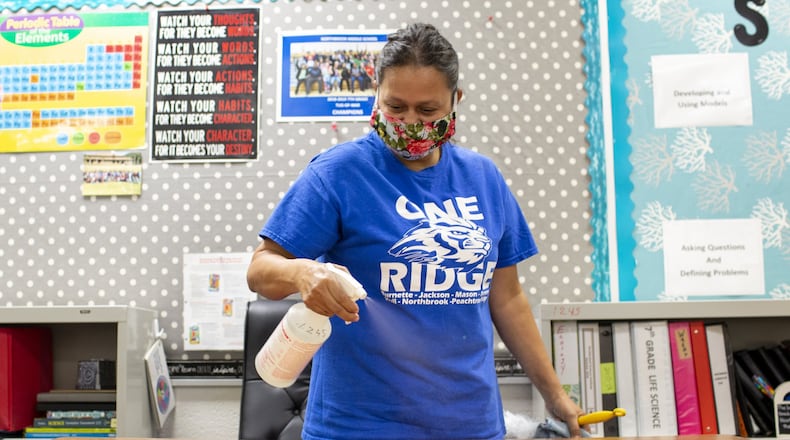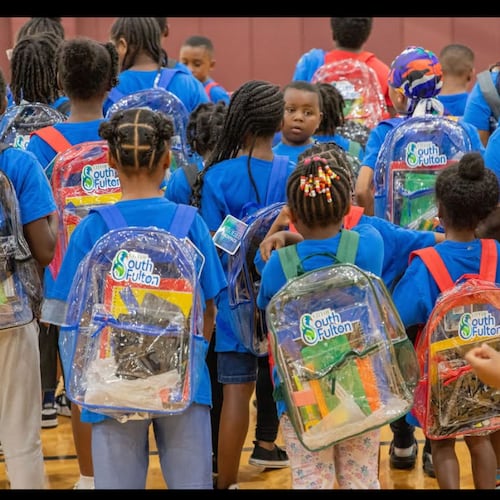Georgia teachers exposed to the coronavirus but not showing symptoms would be allowed to remain in their classrooms instead of quarantining if they are placed in a special category of workers being pushed by school leaders.
Most Georgia school superintendents say they need teachers to be designated “essential” or “critical” members of the workforce, fearing that the rules requiring them to stay at home for 14 days if exposed to the virus will quickly deplete their ranks and force the closure of schools. Rapidly spreading COVID-19 cases have upended the back-to-school season, forcing staff and students to quarantine and prompting some school buildings to close within days of opening.
Gov. Brian Kemp is considering the idea, and teachers groups are alarmed.
The proposal “endangers lives and starkly contradicts” state public health guidance, said Craig Harper, executive director of the Professional Association of Georgia Educators, the largest such association in the state.
Verdaillia Turner, president of the Georgia Federation of Teachers, said teachers have already been protesting some districts’ reopening plans out of fear for their health.
“Teachers did not sign up to give their lives to their jobs, literally, so let’s first get that straight,” she said.
The Georgia School Superintendents Association surveyed members this week, and 139 said they want educators deemed essential workers; 12 did not, said John Zauner, the organization’s executive director.
“We will not be able to operate if our teachers are not considered exempt under critical infrastructure,” one told Public Health Commissioner Dr. Kathleen Toomey during a conference call last month, according to a written record of the meeting obtained by The Atlanta Journal-Constitution through the state open records act.
“I’m still trying to figure out how a fast-food worker can be essential but a teacher is not,” Steve Smith, the superintendent in Bleckley County south of Macon, said in an interview with the AJC. “We’re just trying to say, ‘hey, if these folks aren’t essential, who is?‘”
Smith acknowledged the change might be a tough one for Kemp to make given the high infection rate in Georgia. ”In the face of rising spread, it’s probably hard for the governor to say, ‘hey, let’s bring these people back more quickly.‘”
A Kemp spokesperson said Thursday that the governor’s office had heard from “several” superintendents who want their teachers given essential worker status. “Right now, we are soliciting input from various stakeholders, including teachers, parents, and school leaders,” the spokesperson, Candice Broce, said in an email. State health officials are involved in the discussion, she said, adding: “No decision has been made. We want to hear from our constituents.”
The U.S. Department of Homeland Security describes teachers as part of the nation’s “essential critical infrastructure workforce,” in a document that is a guide rather than a mandate.
Forsyth County already labels teachers as “critical infrastructure” and “essential” workers. It asserts on its website that its employees can return to work after exposure if they are not ill and remain asymptomatic. They are to undergo twice-a-day temperature checks, wear a mask and take other precautions.
Determinations about teachers returning to classrooms are made on a case-by-case basis, spokeswoman Jennifer Caracciolo said in an email. She said there is a need to provide students with “the essential public education to which they are entitled.”
She said the district’s attorney reviewed the governor’s previous executive orders related to essential workers. The attorney’s interpretation “was that all school employees were essential workers.”
Credit: Steve Schaefer
Credit: Steve Schaefer
Tiffany Robbins, a Cherokee County teacher and president of the Cherokee Educators Association, said if teachers aren’t required to quarantine they potentially could spread the virus to hundreds of children daily.
”No teacher wants the illness or death of a child on their conscience,” she said, in an email. “The problem in schools at the moment is the lack of adult supervision due to quarantines and illness is causing schools to close. Nobody has asked about curriculum this year. The purpose of a school used to be to educate children. I am not sure that we can continue to say that is the purpose of schools today.”
Other teachers are open to the designation if it will allow them to keep teaching.
“We signed up to do whatever’s best for our kids. That’s why we’re essential,” said Sarah Belisle, a seventh grade science teacher in Cartersville.
In the metro area’s core counties, Atlanta Public Schools will hold its first day of virtual classes next week. Teachers will be allowed to work from their classrooms, but the district does not intend to exempt any employees from current health guidance.
The Gwinnett County school district will continue to quarantine those exposed during “close contacts” for 14 days, said spokeswoman Sloan Roach. The system is currently online and plans to phase in face-to-face learning beginning Aug. 26.
Fulton County Schools has not declared its roughly 6,000 teachers to be “critical infrastructure,” said spokesman Brian Noyes. Students are currently online only, and teachers are expected to teach virtually from their classrooms. Teachers who test positive for the virus are to stay home.
If a teacher reports that they have been exposed to the virus, the district consults with the Fulton County Board of Health. Those deemed to have a low risk of infection are expected to work from the school building. Those at a high risk can teach from home for 15 days, Noyes said.
Noyes said he doesn’t know if the district’s process will change once students return to school buildings.
Keep Reading
The Latest
Featured






